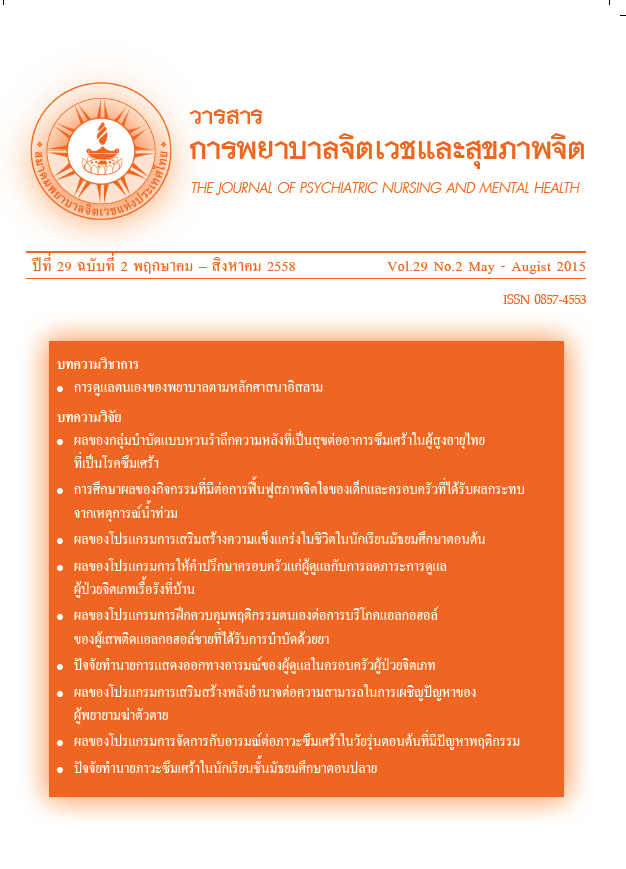การศึกษาผลของกิจกรรมที่มีต่อการฟื้นฟูสภาพจิตใจของเด็กและครอบครัวที่ได้รับผลกระทบจากเหตุการณ์น้ำท่วม A STUDY OF ACTIVITIES’ EFFECT ON MENTAL REHABILITATION OF CHILDREN AND FAMILIES WHO HAVE BEEN AFFECTED BY FLOODS
Main Article Content
บทคัดย่อ
Objectives: To study the activities’ effect on mental rehabilitation of children and families who have been affected by the floods.
Methods: Activities for restoring children and their families’ mental health were processed in three following steps: 1) Exploring the psychological impact of experiencing flooding on children and families, 2) Planning and Implementing activities, and 3) Evaluating. The purposive sampling was used. Sample were 422 people, including parents, children and adolescents, and leaders in the local administration. The research measurements for data collection used in this study consisted of the child developmental evaluation, the Emotional Quotient Questionnaire, the Psychological Impact Screening Tool for at risk children, the Stress Questionnaire, and focus group discussion guide. Data were analyzed using descriptive statistics by frequency, percentage, mean, standard deviation, and the pair t-test.
Results: After the implementation of activities, the results revealed that there were the progression on children’s developments. There was no significant change of emotional quotients’means, comparing before and after receiving activities. However, it was found that several aspects of emotional intelligence of children aged 3 to 5 years were increased such as the emotional recognizability, kindness, conscience and conscious and warmth. In addition, emotional intelligence of children aged 6 to 11 years were improved in all areas. Moreover, the intervention can decrease parents’ stress levels.
Conclusion: Activities for mental rehabilitation affected and recovered children and families who have been affected by the floods.
วัตถุประสงค์: เพื่อศึกษาผลของกิจกรรมต่อการฟื้นฟูสภาพจิตใจของเด็กและครอบครัวที่ได้รับผลกระทบจากเหตุการณ์น้ำท่วม
วิธีการศึกษา: ดำเนินกิจกรรมเพื่อฟื้นฟูสภาพจิตใจเด็กและครอบครัวตามขั้นตอนดังนี้ 1) การสำรวจผลกระทบด้านจิตใจต่อเด็กและครอบครัว 2) การวางแผนและดำเนินกิจกรรม 3) ประเมินผล กลุ่มตัวอย่างจำนวน 422 คน ประกอบด้วยพ่อแม่/ผู้ปกครอง เด็กและวัยรุ่น และแกนนำในองค์การบริหารส่วนท้องถิ่น ได้มาโดยการเลือกแบบเจาะจง เครื่องมือที่ใช้ในการเก็บรวบรวมข้อมูลประกอบด้วย แบบประเมินพัฒนาการเด็ก แบบประเมินความฉลาดทางอารมณ์ แบบคัดกรองเด็กกลุ่มเสี่ยงที่ได้รับผลกระทบด้านจิตใจ แบบประเมินระดับความเครียดของพ่อแม่/ผู้ปกครอง และแนวคำถามการสนทนากลุ่ม วิเคราะห์ข้อมูลโดยใช้สถิติเชิงพรรณนาโดยการแจกแจงความถี่ ค่าร้อยละ ค่าเฉลี่ย ส่วนเบี่ยงเบนมาตรฐาน และ pair t-test
ผลการศึกษา: ภายหลังการดำเนินกิจกรรมพบว่าเด็กมีพัฒนาการด้านต่างๆ ดีขึ้น ค่าเฉลี่ยของความฉลาดทางอารมณ์ของเด็กเปรียบเทียบระหว่างก่อนและหลังทำกิจกรรมไม่มีความแตกต่างกัน แต่พบว่าเด็กอายุ 3-5 ปี มีค่าความฉลาดทางอารมณ์ด้านการรู้จักอารมณ์ การมีน้ำใจรู้ว่าอะไรถูกผิด และความอบอุ่นใจเพิ่มขึ้น เด็กอายุ 6-11 ปี มีค่าความฉลาดทางอารมณ์เพิ่มขึ้นทุกด้านกลุ่มพ่อแม่/ผู้ปกครอง และแกนนำมีระดับความเครียดลดลง
สรุป: กิจกรรมเพื่อฟื้นฟูสภาพจิตใจเด็กและครอบครัวมีผลต่อการฟื้นฟูสภาพจิตใจของเด็ก และครอบครัวที่ได้รับผลกระทบจากเหตุการณ์น้ำท่วม
Article Details
บทความที่ได้รับการตีพิมพ์แล้ว เป็นลิขสิทธิ์ของสมาคมพยาบาลจิตเวชแห่งประเทศไทย

